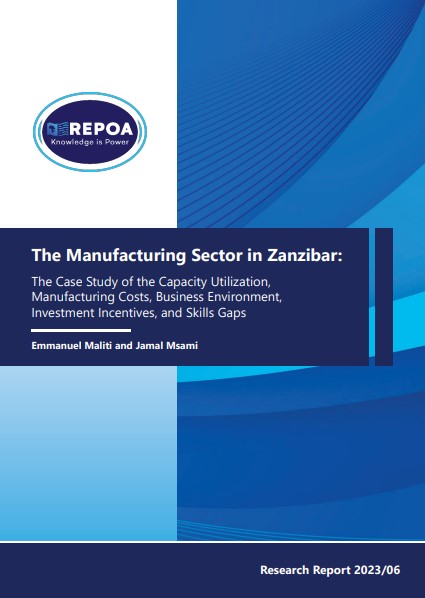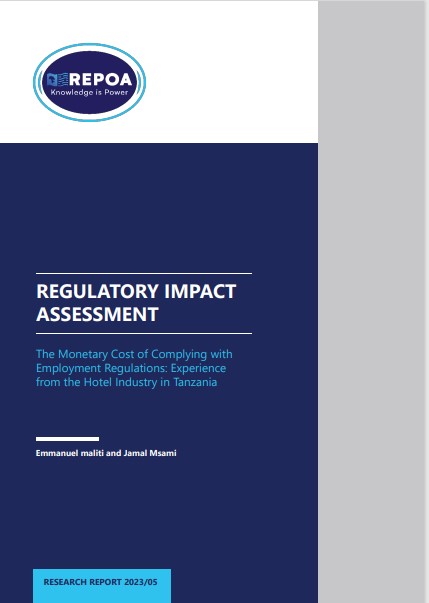The Manufacturing Sector in Zanzibar: The Case Study of the Capacity Utilization, Manufacturing Costs, Business Environment, Investment Incentives, and Skills Gaps

The Revolutionary Government of Zanzibar (RGoZ) is determined to spur industrialization as among the means to meet the Zanzibar Vision 2025 of attaining the “upper middle-income status by the year 2050 through sustainable and inclusive human development1 ” This study aims at supporting such efforts by building a knowledge base and inform policy reforms in […]
REGULATORY IMPACT ASSESSMENT: The Monetary Cost of Complying with Employment Regulations: Experience from the Hotel Industry in Tanzania

This Regulatory Impact Assessment (RIA) is a result of joint efforts between REPOA and the Hotel Association of Tanzania (HAT). The RIA quantifies the cost that tourism business operators, in particularly the accommodation businesses, incur when complying with the existing employment regulatory regime. The RIA primarily responds to the following questions: How much compliance costs […]
The monetary cost of complying with employment regulations: The experience from the hotel industry
This Policy Brief highlights the associated monetary cost of complying with employment regulations: The experience from the hotel industry in Tanzania. As stated by the International Finance Corporation (IFC) and World Bank (2012), if compliance costs are high in a country, policymakers need to know which regulatory regimes cause most of the burden to businesses […]
The time and monetary costs of regulatory compliance: The experience from the hotel industry
This Policy Brief highlights the associated time and monetary costs of regulatory compliance – the experience from the hotel industry in Tanzania. In the quest to address the highlighted compliance cost challenge, REPOA offers the following Policy Recommendations: Ready the full details just below…
Are there Employment Prospects for Partnered Women in Tanzania when Migrating? Evidence from the National Panel Data
This study considers the effects of family migration on labor market outcomes for the migrant partnered women. Whereas most partnered women are ‘tied’ migrants, results from the dynamic random effects model establish that, migrant women who were not employed in their previous places of residence are more likely to find jobs than similar non-migrant women. […]
The State of Business Environment in Tanzania
This report highlights the state of the business environment in Tanzania by presenting both the trends and current status of key areas affecting DB. The next section set the analytical stage by outlining the conceptual framework followed by methodology (section 3) and review of policies (section 4). Section 5 as the core section of the […]
Affordability and Expenditure Patterns for Electricity and Kerosene in Urban Households in Tanzania
Can the urban poor of Tanzania afford the cost of using modern sources of energy,1 i.e. electricity, liquefied petroleum gas (LPG) and kerosene? This question has been repeatedly raised, primarily in the political arena, and unfortunately less so in academia. Three major factors reveal the importance of energy affordability in Tanzania. First and foremost is […]
Affordability and Expenditure Patterns for Electricity and Kerosene in Urban Households in Tanzania
Using data from the Household Budget Survey 2007, this study examines two main issues: i) the affordability of kerosene, liquefied petroleum gas (LPG) and electricity to poor urban households, i.e., households below the basic needs poverty line;
A Comparative Analysis of Poverty Incidence in Farming Systems of Tanzania
This study analysed poverty incidence in relation to Tanzania’s major farming systems utilising data from the Agriculture Sample Census 2002/03. The analysis found that poverty incidence differed considerably by farming system. The study also confirmed…
Children’s Involvement in Small Business: Does it Build Youth Entrepreneurship?
This brief summarises the findings of a study conducted in Dar es Salaam, Tanzania in 2006 that examined how children’s work in small businesses impacts the development of their entrepreneurship. The study revealed that the participation of children in small businesses is largely influenced by push factors, particularly the lack of educational opportunities and alternative […]
Children’s Involvement in Small Business
Does it Build Youth Entrepreneurship? This study assessed how children’s work in small businesses impacts their future entrepreneurial talents, by examining i) the economic, psychological and social factors that prompt children into small businesses; ii) the contribution of small business…
Assessing the Institutional Framework for Promoting the Growth of Micro and Small Enterprises (MSEs) in Tanzania: The Case of Dar es Salaam
This brief examines the institutional framework for supporting the growth of micro and small businesses in Tanzania. Findings indicate a high demand for business support among MSEs but only limited use of services, such as loans from financial institutions, due to the complexity and stringency of conditions to access these services. On the supply side, […]
Assessing the Institutional Framework for Promoting the Growth of MSEs in Tanzania
The Case of Dar es Salaam This paper contains the results of a study conducted in Dar es Salaam in 2006 and 2007 to assess the MSEs institutional support. The study focused on the type and nature of the MSE support institutions which included services they provide, conditions for assessing the services and their needs. […]
The Role of Small Businesses in Poverty Alleviation
The Case of Dar es Salaam, Tanzania Study of micro and small-scale business in Dar es Salaam. Issues covered include the contribution to poverty alleviation, the influence of socio-economic factors, and the impact of business formality.